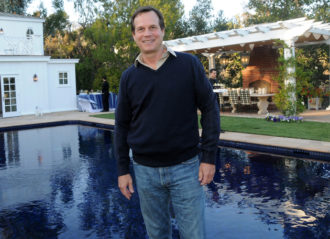Brett Morgen On Directing ‘Jane’ & Jane Goodall’s Love Story With Hugo van Lawick [VIDEO EXCLUSIVE]
Director Brett Morgen worked with National Geographic to offer an incredible new look at scientist Jane Goodall. The company found over one hundred hours of previously-unseen footage of Goodall’s work in Africa, and decided to make a new documentary about it with Morgen directing.
“I was out on the road promoting a movie about Kurt Cobain called Montage of Heck when I received a call from National Geographic,” Morgen told uInterview in an exclusive video. “They had recently unearthed 140 hours of never-before-seen footage of Jane’s earliest expeditions in Africa. At first, I was reluctant to get involved in part because I felt like, haven’t there been films made about Jane? And it didn’t really seem like it was of my wheelhouse. But as soon as I looked at the footage, I knew that this was something I had to do. Sometimes films choose us, sometimes we choose our films, but this was def a sit. when the film not only chose us but chose the time to come out into the world.”
Once Morgen agreed to work on the project and delved into the footage, he was shocked by the new information he discovered in Goodall’s storyline. “One of the remarkable things about this film is that National Geographic had sent out a young photographer [Hugo van Lawick] to document Jane’s work, and he was a neophyte, he had never done anything before, Jane had never done anything before, and surprise, surprise, they’re stuck out in the middle of Eden together, and they fell in love,” Morgen said. “And what’s striking is they fell in love through the lens of the camera, so over the course of the film, you literally watch the way he’s looking at her through the lens and she’s looking back at him, and that tells you everything you need to know about the state of the relationship. It was a really once-in-a-lifetime opportunity, and more than that, it’s not just a love story about a woman and a man, but it really is a love story about a woman and her work. And what’s so inspiring, I think, is that it’s a story in which a woman does not have to give up her work in order to have a family, which is very much a part of our narrative, which is not something you see on screen every day.”
Morgen’s respect for Goodall only grew as he worked with her on the film. He was impressed by her upbringing and by her determination. “Jane refused to be defined by the status quo, she refused to be defined by the structure opposition,” the director explained. “She had a willingness to success and a confidence that was bestowed upon her by her mother Van who really nurtured her, and listened to her, and inspired her to dream big. And Jane never had anyone telling her no, so she was just gonna go do it.”
But what Morgen really loved about working with Goodall was almost her disinterest in having her story told again. “I think that most people when they see the film are surprised by Jane’s personal conflicts that they were not really aware of. For me personally, when I went to go interview her, few people recognize how funny the woman is and how solid she is,” he said. “Most people when going to tell their legacy or their story, they try to seduce the biographer. If Jane was trying to seduce me, I was blind to it, because she could not have been more disinterested in the process. That is until she saw the film, and now she seems to be quite happy with it, but I love that about her. I love that she made me work for every little victory.”
RELATED ARTICLES
Get the most-revealing celebrity conversations with the uInterview podcast!



![Brett Morgen On Directing ‘Jane’ & Jane Goodall’s Love Story With Hugo van Lawick [VIDEO EXCLUSIVE]](https://cdn-o9.uinterview.com/wp-content/uploads/2017/11/Jane_Goodall.jpg)
 Click here for the In Memoriam: Celebrities Who Died In 2017 Slideshow
Click here for the In Memoriam: Celebrities Who Died In 2017 Slideshow



Leave a comment